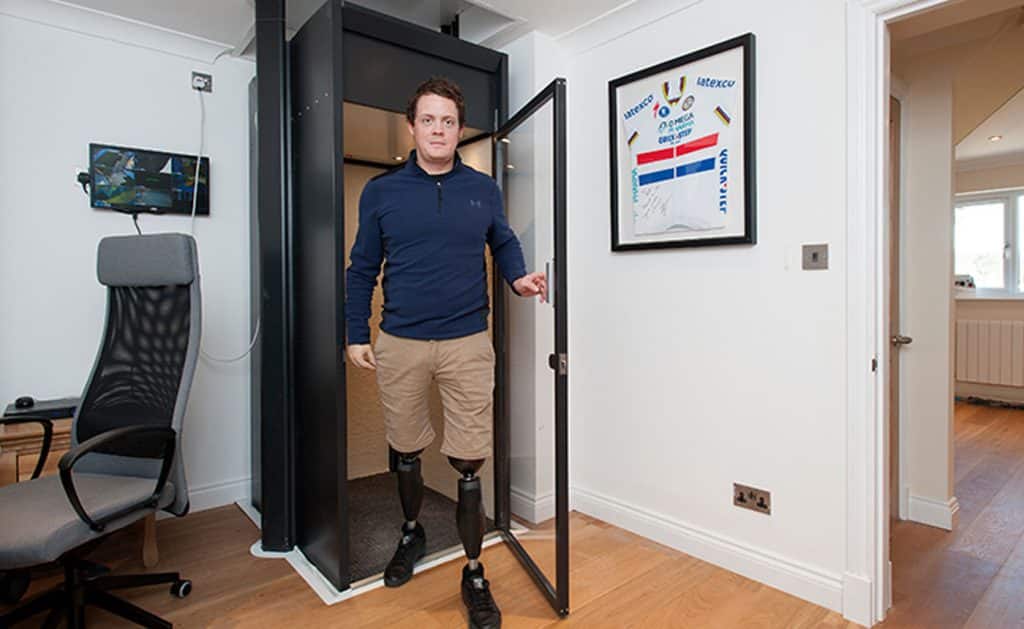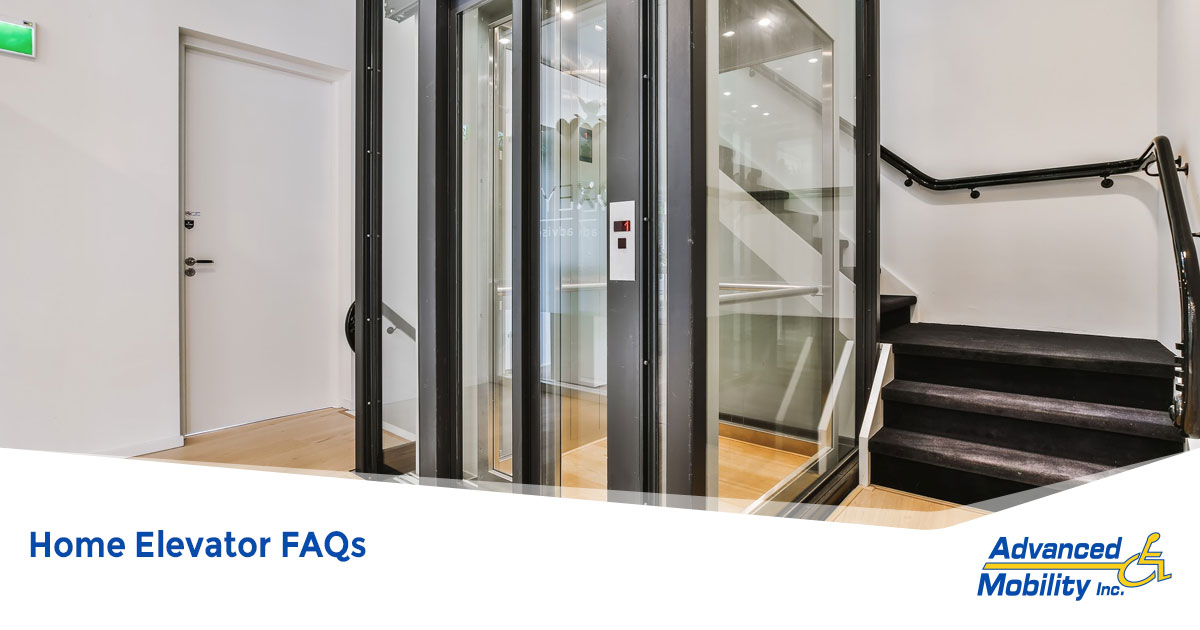Various studies show that more and more people age 50+ (about 77%) are choosing to age in place in South Florida. Home elevators are now becoming an essential feature, not just a luxury item.
Whether you are upgrading your multi-level home for better access or anticipating future mobility needs, installing a home elevator will offer convenience, safety, and add value to your home.
To help you make an informed decision, we’ve answered 10 of the most frequently asked questions, and debunked 7 myths.
What Is A Home Elevator?
A home elevator, also known as a residential elevator or home lift, is a compact lift system that is designed for residential homes. It provides vertical transport between floors, and it is built with stringent safety codes. A home elevator is ideal for extended families or seniors choosing to age in place.
People who consider installing home elevators include:
- Seniors who are choosing to age in place
- Residents with mobility challenges and conditions like arthritis, multiple sclerosis or other mobility-limiting conditions
- Residents who are recovering from surgery or injury
- Anyone who requires wheelchair access in a multi-level home

10 Frequently Asked Questions About Home Elevators
To help you make an informed decision about home elevators, we have compiled 10 frequently asked questions surrounding home elevators.
1. How Much Do Home Elevators Cost?
The cost will vary depending on the size, the type, and the complexity of the installation. Contacting professional home elevator installers will ensure that you get a home elevator to match your budget. It usually costs a little bit more to retrofit an elevator into an existing home than it does to install a residential elevator in a home that is being constructed.
2. How Long Does Installation Take?
A professional home elevator installer will come and assess the area where the elevator will be installed. The time it will take depends on the complexity of the installation. New construction usually takes less time than retrofitting an elevator into an existing home.
3. What Type Of Elevator Is Best For Me?
Consulting a professional will help you decide what type of elevator is best for you. They will consider factors such as what you will be using the elevator for, the available space for elevator construction, and your budget.
4. Are home elevators safe?
Modern home elevators are very safe. They must follow the ASME A17.1 safety standards and include numerous safety features like:
- Over-speed governors that prevent the elevator from moving too quickly.
- Interlocking doors and gates that will not open unless it is safe to do so.
- Back-up batteries that safely move the elevator to the nearest exit floor in the event of a power outage.
- Multiple high-strength cables that will prevent the elevator from free-falling in the event of a malfunction.
- Emergency braking system.
- Sensitive door sensors that will prevent doors from closing on residents entering or exiting the elevator.
5. Do Elevators Take Up A Lot Of Space?
This will depend on the type of residential elevator that is installed. The space requirement will need to accommodate the elevator car, the shaft, the pit, and, in some instances, the machine room.
6. How Often Will Maintenance Be Required?
Regular maintenance is essential to ensure the elevator functions safely. Depending on the make and model, professionals will advise that the residential elevator requires an inspection and maintenance annually or biannually.
7. What Is The Lifespan Of A Residential Elevator?
Depending on the make and the model, modern residential elevators have a lifespan of about 25 to 30 years. Homeowners will ensure the longevity of the elevator with regular maintenance and inspection.
8. Can I Install A Home Elevator Myself?
No, a residential elevator is a safety-critical structure, and must only be installed by a qualified, licensed, and insured professional.
9. What Happens During A Power Outage?
One of the safety features of modern residential elevators is a battery backup. Depending on the make and model, the battery backup will either last for a few hours, allowing you to use the elevator, or it will be sufficient to get you to the next level.
10. Do Residential Elevators Add Value To The Home?
Yes. A Florida study has found that home elevators increase the resale value by up to 30%. They also expand the market appeal, especially for buyers who are choosing to age in place or have limiting mobility challenges.
7 Residential Elevator Myths – Busted
Many residents are deterred from installing home elevators due to misinformation. Here are seven myths (busted) about home elevators:
1. They Are Very Expensive And Only Designed For Big Luxury Homes
Modern elevators are accessible across budgets. While traditionally seen as luxury items, the modern options allow people to customize residential elevators to their home and to their budget.
2. They Often Malfunction
Modern residential elevators are constructed of durable materials. If installed by professional, licensed, and insured installers and maintained regularly, they are very reliable.
3. They Will Free-Fall If A Cable Breaks
Elevators do not have only one cable or screw system. They usually have multiple cables that can independently hold the full weight of the car. They also have a safety feature that buzzes and stops the elevator from closing the door/moving if a cable breaks or if the car is overloaded.
4. People Can Get Trapped With No Airflow
The backup battery will ensure that the cab moves to the exit floor. Phone intercoms installed in the elevator car will ensure that occupants can communicate and ask for assistance if necessary.
The cabs are not airtight, but are ventilated so that, should you be in the cab for a while, there is enough airflow.
5. The Door May Open Between Floors
Interlocks and specialized sensors prevent doors from opening midshaft. All residential elevators come with these safety features.
6. Residential Elevators Are Very Noisy
Modern home elevators have up-to-date motors that operate quietly. Some are even silent.
7. They Take Up A Lot Of Space
Residential elevators come in various sizes. A qualified consultant can evaluate the area and advise on/customize the elevator to the available space.
Home Elevators With Advanced Mobility Inc
At Advanced Mobility Inc., we understand that Independence and safety are not luxuries but are an essential part of living with dignity and comfort. Our home elevators are designed to enhance your lifestyle and provide peace of mind for you and your loved ones.
Our personalized mobility solutions and deep commitment to quality will help you move freely and confidently within your own home. For an in-home consultation, contact us at 954-888-9292 today.






